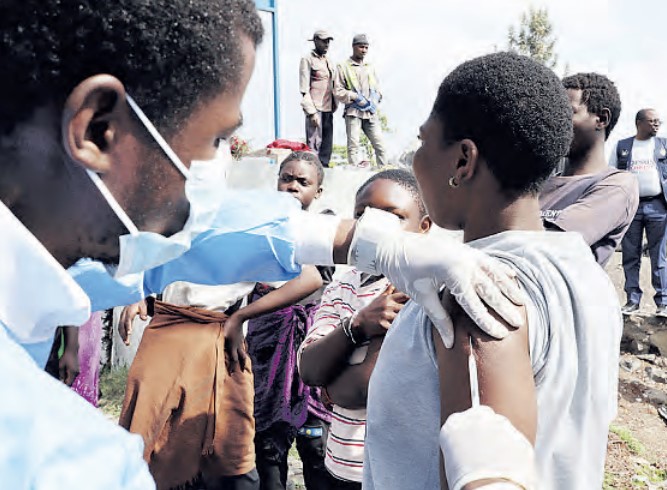
Kenya to access more tools for mpox testing
The Xpert mpox test delivers results in under 40 minutes
The choice of countries was informed by their readiness and epidemiological data.
In Summary

Kenya is among the first African countries who have been allocated thousands of doses of the mpox vaccine, with the inoculation exercise expected to begin later in November or December.
The donation was made by Gavi, the European Union and the United States, which have surplus jabs. In total, the three donated 899,000 doses to nine African countries including Kenya. Uganda, Rwanda, the Democratic Republic of the Congo, Central African Republic, Côte d’Ivoire, Liberia, Nigeria and South Africa also make the list.
The amounts each country receives will be determined by the Access and Allocation Mechanism platform established by the World Health Organization.
For most countries, the rollout of M-pox vaccines will be a new undertaking.
Implementing targeted vaccination requires additional resources. Partners of the M-pox AAM, set up last month, are working to scale up the response.
Further allocations of vaccines are expected before the end of the year.
“The largest number of doses – 85 per cent of the allocation or 764,150 doses – will go to the DR Congo because it is the most affected African country, reporting four out of every five laboratory-confirmed cases in Africa this year,” WHO said in a statement.
The choice of countries was informed by their readiness and epidemiological data.
Vaccination is recommended as a part of a comprehensive response strategy, focusing also on timely testing and diagnosis, effective clinical care, infection prevention and the engagement of affected communities.
Kenya has confirmed 17 cases so far and one death.
“The National Public Health Laboratory has confirmed three new cases from Mombasa, Nakuru, and Nairobi counties,” the Ministry of Health said in a statement last week.
The Ministry said it identified and was monitoring 83 contacts, of which 78 have completed the required 21-day follow-up.
“Three of these contacts tested positive for M-pox, while two remain under active follow-up,” the statement read.
MoH established a National Taskforce on M-pox and Marburg Virus Disease on September 9.
The taskforce is coordinating a whole-of-government response, including training healthcare workers and establishing specialised treatment units.
The first phase targets the vaccination of approximately 1.4 million people who are at risk of infection in the nine countries, by the end of 2024.
An initial 2.8 million doses of the MVA-BN vaccine were allocated for this effort.
More people at risk in affected communities will be vaccinated, as additional doses of vaccine are available.
Special attention will be given to vulnerable populations, including those living with HIV, internally displaced persons, and refugees, due to their increased risk of severe outcomes.
The outbreak of M-pox, particularly the surge of the viral strain clade Ib in the DR Congo and neighbouring countries, was declared a public health emergency of international concern by WHO and a public health emergency of continental security by Africa CDC in mid-August.
The epicentre of the outbreak remains the DRC, with
over 38,000 suspected cases and over 1,000 deaths.

The Xpert mpox test delivers results in under 40 minutes